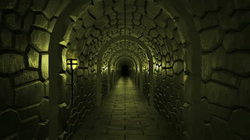Pick the answer not the lock
 . Let K1, K2, K3, K4, K5 be 5 distinguishable keys, and let D1, D2, D3, D4, D5 be 5 distinguishable doors.
For 1 ≤ i ≤ 5, key Ki opens doors Di and Di+1 (where D6 = D1) and can only be used once. The keys
and doors are placed in some order along a hallway. Key$ha walks into the hallway, picks a key and
. Let K1, K2, K3, K4, K5 be 5 distinguishable keys, and let D1, D2, D3, D4, D5 be 5 distinguishable doors.
For 1 ≤ i ≤ 5, key Ki opens doors Di and Di+1 (where D6 = D1) and can only be used once. The keys
and doors are placed in some order along a hallway. Key$ha walks into the hallway, picks a key and
opens a door with it, such that she never obtains a key before all the doors in front of it are unlocked. In how many such ways can the keys and doors be ordered if Key$ha can open all the doors? Clarifications: • The doors and keys are in series. In other words, the doors aren’t lined up along the side of the hallway. They are blocking Key$has path to the end, and the only way she can get past them is by getting the appropriate keys along the hallway. • The doors and keys appear consecutively along the hallway. For example, she might find K1D1K2D2K3D3K4D4K5D5 down the hallway in that order. Also, by “she never obtains a key before all the doors in front of it are unlocked, we mean that she cannot obtain a key before all the doors appearing before the key are unlocked. In essence, it merely states that locked doors cannot be passed. • The doors and keys do not need to alternate down the hallway.
The answer is 187120.
This section requires Javascript.
You are seeing this because something didn't load right. We suggest you, (a) try
refreshing the page, (b) enabling javascript if it is disabled on your browser and,
finally, (c)
loading the
non-javascript version of this page
. We're sorry about the hassle.
0 solutions
No explanations have been posted yet. Check back later!